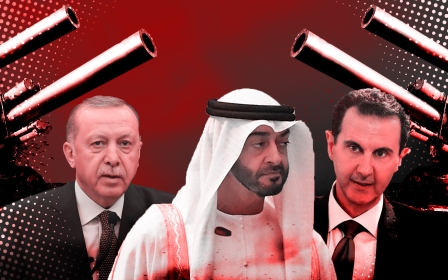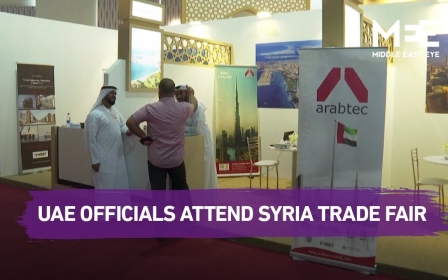Rami Makhlouf takes spat with Syria's Assad public in video plea

The spat between Bashar al-Assad and his billionaire cousin Rami Makhlouf burst into the public domain on Thursday evening, as the latter called on the Syrian president to rescue his companies from collapsing after being told to pay a $120m penalty for tax evasion.
In a rare video published on his Facebook page, Makhlouf denied allegations that his telecommunications company Syriatel evaded taxes, reminding Assad of his financial support and charitable work during the nine years of civil war in Syria.
Makhlouf also posted a written note saying: “After reports about a donation we planned to make during the holy month of Ramadan to assist our people, things got out of control.
“We received threats to stop our work, simply because we dared to publicly offer assistance to the needy ... Why is it that the more grants we offer, the more curses we receive?”
New MEE newsletter: Jerusalem Dispatch
Sign up to get the latest insights and analysis on Israel-Palestine, alongside Turkey Unpacked and other MEE newsletters
Makhlouf said that the Syrian government is asking his companies to pay 50 percent taxes on its profit, despite the fact that it pays the salaries of around 6,500 employees and has huge expenses in a war-torn country.
'We received threats to stop our work, simply because we dared to publicly offer assistance to the needy ... Why is it that the more grants we offer, the more curses we receive?'
- Rami Makhlouf
In 2019, Syriatel, the biggest telecommunications company in Syria with 11 million users, was asked to pay 12bn Syrian pounds ($23m) in taxes.
"I respect your decision Mr President, and it's my duty to carry it out [pay the government money] but I'm begging you to give the requested funds to those in need," he said.
Makhlouf is one of the most influential figures in Syria.
He is thought to have once controlled around 60 percent of the Syrian economy before war broke out in 2011, through a complex network of companies working in oil, construction, banking, airlines and telecommunications, according to the Financial Times.
His wealth was estimated to be worth $5bn before the outbreak of the uprising.
The whereabouts of Makhlouf, the son of a former commander in the Syrian Republic Guard, is unclear.
In 2019, the assets of the Al-Bustan Association, a charity run by Makhlouf and suspected of being linked to financing a pro-government militia, were seized by the Syrian government.
Syria’s Telecommunications and Postal Regulatory Authority ordered Syriatel and MTN, another mobile phone network owned by Makhlouf, to pay about 234bn Syrian pounds ($255m) as a tax penalty.
Makhlouf's Facebook post and video came five days before the 5 May deadline for the two companies to comply with the decision.
Makhlouf has been put on a US sanctions list for supporting the Damascus government and was described as "Syria's poster boy for corruption" in a January 2008 US State Department cable.
Last month, Saudi Arabia uncovered a stash of 44.7m amphetamine pills, known as captagon, that was being smuggled into the kingdom from Syria in cargo bearing the logo of one of Makhlouf's companies.
Makhlouf's sons Mohammad and Ali have become notorious symbols of the excess that members of the pro-Assad elite have enjoyed during Syria's catastrophic nine-year conflict. Around half a million people have been killed in the war, the majority by pro-Syrian government forces.
In April, Instagram apologised for featuring footage of Mohammad Makhlouf celebrating his birthday in self-isolation as part of a feature on the coronavirus pandemic.
Middle East Eye delivers independent and unrivalled coverage and analysis of the Middle East, North Africa and beyond. To learn more about republishing this content and the associated fees, please fill out this form. More about MEE can be found here.




